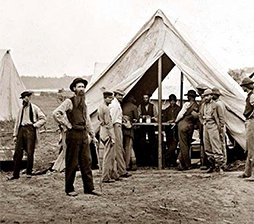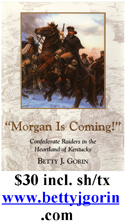|
Civil War sutlers filled genuine need,
although maligned as ‘greedy swindlers’
Resented because of their inflated prices and frequently maligned as “greedy swindlers” and members of “Robbers Row,” Civil War sutlers actually filled a need important to a soldier’s daily life.
Sutlers, who sold goods not provided by the army, served as grocery and dry-goods dealers and were the equivalent of today’s Post Exchange. Commonly stocked items included popular foods such as cheese, butter, fresh and dried fruit, milk, eggs, syrup, molasses, candy, crackers, fresh and canned meat, oysters, pepper, mustard, pickles, sardines and self-rising flour. Also, there was illegal liquor, shirts, socks, shoes, haversacks, blankets and belts.
Other popular items included chewing and pipe tobacco, cigars, razors, toothbrushes, combs, soap, needles and thread, stamps, stationery, pens and ink, newspapers and books, officers’ uniforms, pistols and cartridges.
Sale of liquor was prohibited, but many sutlers would drop peaches in whiskey and sell “pickled peaches.” Bay rum hair tonic or alcohol-spiked patent medicines also provided “spirits.”
One sutler was appointed for each regiment and was licensed to sell provisions in the field, camp or quarters. Sutlers were given a list of articles they could sell by the Inspector General Department and, technically, prices were set by a board of officers.
Sutlers could sell to soldiers on credit, but the credit was not to exceed one-third of a man’s monthly pay without permission of a commanding officer. Sutlers could collect at the pay table when the soldiers were being paid. Many merchants increased their profits by providing change in scrip or tokens redeemable only in their own establishments. Also, peddlers were barred from many camps, giving the sutlers a decided monopoly.
Most Confederate regiments did not have sutlers because of the scarcity of goods, high prices in the South and widespread conscription.
The word “sutler” is an English military term originating from the Dutch word “soetelaar” or “zoetelaar” which is translated as “one who does dirty work” or performs mean duties or follows a low trade.
Although they often realized great profits, sutlers also experienced great risks. Spoilage and damage from the weather cut into profits and many could lose everything when camps or wagon trains were overrun by enemy forces. In addition, there was the danger of being plundered by men who felt they had been cheated.
Officers tended to look the other way when a sutler raid occurred if they felt their men were justified.
Sutlers served the American military beginning with the French and Indian War, but were abolished because of the abuses of the Civil War period.
Modern-day sutlers are a far cry from those of the 1860s and are sought-after and welcomed at re-enactments across the nation.
|











